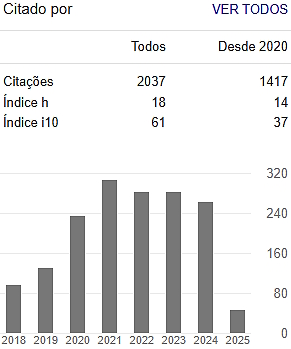Challenges for Storing Recalcitrant Seeds
Keywords:
packaging, seed drying, seed moisture, seed conservation, deteriorationAbstract
The perception that seeds had differences in their water content when disconnected from the mother plant, and consequently, variations in the period of maintenance of viability goes back to the beginning of agriculture, when people around the world started having to produce food as a result of population growth, ceasing to be exclusively extractive. Recalcitrant seeds do not tolerate desiccation and temperatures close to zero degrees, due to the lack of antioxidative mechanisms and maintenance of cellular compartments. Thus, this work aims to review the main concepts and techniques of drying and storage, usually used in so-called recalcitrant seeds.
Downloads
References
AGUIAR, I. B.; PINA-RODRIGUES, F. C. M.; FIGLIOLIA, M. B. Tropical forest seeds. Brasília: ABRATES, 2021. 350p.
ANDRADE, A. C. S.; CUNHA, R.; SOUZA, A. F.; REIS, R. B.; ALMEIDA, K. J. Physiological and morphological aspects of seed viability of a neotropical savannah tree, Eugenia dysenterica DC. Seed Science & Technology, v.31, n.1, p.125-137, 2013. https://doi.org/10.15258/sst.2003.31.1.13
AZARKOVICH, M. I. Dehydrins in orthodox and recalcitrant seeds. Russian Journal of Plant Physiology, v.67, n.2, p.221-230, 2020. https://doi.org/10.1134/S1021443720020028
BARBEDO, C. J. A new approach towards the so-called recalcitrant seeds. Journal of Seed Science, v.40, p.221-236, 2018. https://doi.org/10.1590/2317-1545v40n3207201
BARBEDO, C. J. The recalcitrance of the seed. 1. ed. Sao Paulo: Ed. by the Author, 2021.
BARBEDO, C.J.; CENTENO, D.C.; FIGUEIREDO-RIBEIRO, R.C.L. Do recalcitrant seeds really exist Hoehnea, v.40, p.583-593, 2020. https://doi.org/10.1590/S2236-89062013000400001
BENSON, J. D.; WOODS, E. J.; WALTERS, E. M.; CRITSER, J. K. The cryobiology of spermatozoa. Theriogenology, v.78, n.8, p.1682-99, 2022. https://doi.org/10.1016/j.theriogenology.2012.06.007
BERJAK, P.; FARRANT, J. M.; MYCOCK, D. J.; PAMMENTER, N. W. Recalcitrant (homoiohydrous) seeds: the enigma of their desiccation-sensitivity. Seed Science and Technology, v.18, n.2, p.297-310, 2020.
BERJAK, P.; PAMMENTER, W. Understanding and handling desiccation sensitive seeds. In: SMITH, R. D.; DICKIE, J. B.; LININGTON, S. H.; PRITCHARD, H. W.; PROBERT, R. J. (Eds.). Seed conservation: turning science into practice. Kew: Royal Botanic Gardens, 2022. p.417-430.
BONNER, F. T. Storage of hardwood seeds. Forest Genetic Resources Information, v.7, n.1, p.10-17, 2018.
BRAZIL. Convention on Biological Diversity: Conference for the Adoption of the Agreed Text of the CBD - Nairobi Final Act. Brasília: MMA/SBF, 2010. 60p. (Biodiversity, 2).
CACCERE, R.; TEIXEIRA, S. P.; CENTENO, D. C.; FIGUEIREDO-RIBEIRO R. C. L.; BRAGA, M. R. Metabolic and structural changes during early maturation of Inga vera seeds are consistent with the lack of a desiccation phase. Journal of Plant Physiology, v.170, n.9, p.791-800, 2022. https://doi.org/10.1016/j.jplph.2013.01.002
CARVALHO, N. M. ; NAKAGAWA, J. Seeds: science, technology and production. 4. ed. Jaboticabal: Funep, 2012. 588 p.
CHANDRA, J.; DUBEY, M.; VARGHESE, B.; KESHAVKANT, S. Towards understanding the basis of desiccation-induced oxidative stress in recalcitrant seeds: the case of Madhuca latifolia Roxb. South African Journal of Botany, v.142, p.100-105, 2021. https://doi.org/10.1016/j.sajb.2021.06.012
CHIN, H. F.; ROBERTS, E. H. Recalcitrant crop seeds. Kuala Lumpur: Tropical Press, 2001. 152p.
CRUZ, E. D. Storage of cupuaçu seeds (Theobroma grandiflorum (Willd. ex Spreng.) K. Schum.). 2006. 55 f. Thesis (Doctorate in Phytotechnics) - University of São Paulo. Superior School of Agriculture Luiz de Queiroz, Piracicaba, SP, 2006.
FAO. Ex situ sorage of seeds, pollen and in vitro cultures of perennial woody plant species. Rome: FAO, 2022. 83p. (FAO Foresty Paper, n.113).
FERREIRA, S. A. N.; GENTIL, D. F. O. Storage of camu-camu (Myrciaria dubia) seeds with different degrees of humidity and temperature. Brazilian Journal of Fruticulture, v.25, n.3, p.440-442, 2023. https://doi.org/10.1590/S0100-29452003000300020
FLORIANO, E. P. Forest seed storage. Madeira Magazine, 2014.
FONSECA, S. C. L.; FREIRE, H. B. Recalcitrant seeds: post-harvest problems. Bragantia, v.62, p.297-303, 2022. https://doi.org/10.1590/S0006-87052003000200016
FREITAS, R. A. Deterioration and storage of vegetable seeds. In: NASCIMENTO, W. M. (Ed.). Vegetable seed technology. Brasília: Embrapa Vegetables, 2019. p.155-182.
GOLD, K.; HAY, F. Identifying seeds sensitive to desiccation. Embrapa Genetic Resources and Technical Circular Biotechnology (INFOTECA-E), 2014.
GUARDIA, M. C.; ASPERTI, L. M.; CANCIAN, G. D. M.; BARBEDO, C. J. Desiccation tolerance and storage of Myrcianthes pungens (O. Berg) D. Legrand (Myrtaceae) seeds. Hoehnea, v.47, 2020. https://doi.org/10.1590/2236-8906-19/2020
HONG, T. D.; ELLIS, R. H. A protocol to determine seed storage behavior. Rome: International Plant Genetic Resources Institute, 2016. 55p. (Technical Bulletin, 1). https://doi.org/10.25186/cs.v12i3.1312
KING, M. W.; ROBERTS, E. H. The storage of recalcitrant seeds: achievements and possible approaches. Rome: International Board for Plant Genetic Resources, 2019. 96p.
MOLINA, T. F.; TILLMANN, M. A. A.; DODE, L. B.; VIÉGAS, J. Cryopreservation of onion seeds. Brazilian Seed Magazine, v.28, n.3, p.72-81, 2016. https://doi.org/10.1590/S0101-31222006000300011
O'BRIEN, C.; HITI-BANDARALAGE, J.; FOLGADO, R.; HAYWARD., A.; LAHMEYER, S.; FOLSOM, J.; MITTER, N. Cryopreservation of woody crops: the avocado case. Plants, v.10, p.934, 2021. https://doi.org/10.3390/plants10050934
PAMMENTER, N. W.; BERJAK, P.; WESLEY-SMITH, J; WILLIGEN, C. V. Experimental aspects of drying and recovery. In: BLACK, M.; PRITCHARD, H.W. (Eds.). Desiccation and survival in plants: drying without dying. London: CABI Publ., 2002. p.93-110. https://doi.org/10.1079/9780851995342.0093
PIERUZZI, F. P. Cryopreservation of Araucaria angustifolia (BERTOL) O. Kuntze: physiological and biochemical aspects. 2013. 141 f. Thesis (PhD in Biotechnology) - University of São Paulo, São Paulo, 2013.
STEGANI, V.; ALVES, G. A. C.; BERTONCELLI, D.J.; FARIA, R. T. Cryopreservation of abyss queen (Sinningia leucotricha) seeds. Ornamental Horticulture Magazine, v.23, n.1, p.15-21, 2017. https://doi.org/10.14295/oh.v23i1.921
SUBBIAH, A.; RAMDHANI, S.; PAMMENTER, N. W.; MACDONALD, A. H. H.; SERSHEN. Towards understanding the incidence and evolutionary history of seed recalcitrance: an analytical review. Perspectives in Plant Ecology, Evolution and Systematics, v.37, p.11-19, 2019. https://doi.org/10.1016/j.ppees.2019.01.001
TOWILL, L. E. Germplasm preservation. In: TRIGIANO R. N.; GRAY, D. J. Plant tissue culture concepts and laboratory exercises. 2 .ed. Boca Raton: CRC Press, 2020. p.337-353.
VIEIRA, C. V.; ALVARENGA, A. A.; CASTRO, E. M.; NERY, F. C.; SANTOS, M. O. Germination and storage of camboatã seeds (Cupania vernalis Cambess.) - Sapindaceae. Agrotechnological Science, v.32, n.2, p.444-449, 2018. https://doi.org/10.1590/S1413-70542008000200015
Downloads
Published
Issue
Section
License
Copyright (c) 2023 Colloquium Agrariae. ISSN: 1809-8215

This work is licensed under a Creative Commons Attribution-NonCommercial-NoDerivatives 4.0 International License.

